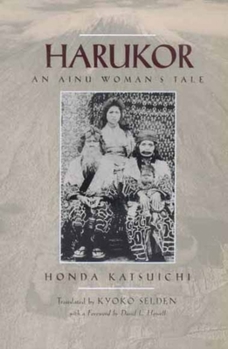Book Overview
In this engaging tale, Honda Katsuichi reconstructs the life of an Ainu woman living on the northern island of Japan over five hundred years ago. Harukor's story, created from surviving oral accounts... This description may be from another edition of this product.
Format:Paperback
Language:English
ISBN:0520210204
ISBN13:9780520210202
Release Date:April 2000
Publisher:University of California Press
Length:350 Pages
Weight:1.15 lbs.
Dimensions:0.9" x 5.5" x 8.3"
Customer Reviews
2 ratings
Equal parts period novel and anthropological text
Published by Thriftbooks.com User , 16 years ago
I usually don't care for historical fiction because the history depicted in most of these novels is often inaccurate, and the author almost always presents an ethnic minority, a conquering nation (that has somehow been vindicated by history) or both in an absurdly romanticized context. I enjoyed this book because it contained no inaccuracies that I was aware of, and because the Ainu of the story were portrayed with a relative minimum of sentimentality. The majority of the book's content is divided into three sections. The first of these is an almost exhaustive overview of Ainu history and culture, presented as much as an educational resource as a expository supplement to the book's story. Essentially, you're getting your money's worth just for this portion of the book. Scholarly English-language resources pertaining to Ainu subject matter are scarce and rather expensive. For the uninitiated, this is an excellent way to learn about this very unique ethnic group. The second part of the book details the life of the titular character from childhood to old age, ending with the departure of her son from their village. While certain plot points feel a bit contrived, Harukor's story is touching and filled with vivid details. Honda's portrayals of women and Ainu have something in common: they are respectful but perhaps a bit too reverent. To be certain, the Ainu were undoubtedly among the most technologically and socially advanced of the world's "primitive" (re: illiterate) peoples, but all credible accounts report them as being as capable of vulgarity as they were of eloquence. This aspect of the Ainu character really should have been represented here. The third part of the book consists of a short story concerning Harukor's son, Pasekur, and ends prior to the first armed conflict between native Ainu and Japanese settlers. While this section of the book provides closure for an extended story, it also effectively places the book's entire fiction into a historical position. The text of the book is supplemented with a wide variety of rustic illustrations and photographs. The third part of the book is succeeded by an informative glossary that provides a translated word list of relevant terms in both Ainu and English and descriptions of a handful of people prominent in Ainu history. The translation of this text from its' Japanese-language source is quite good: colloquial and not too refined. I'd recommend this for anyone who's interested in the Ainu or a simple, pastoral drama in a primitive setting.
A good introduction to Ainu culture
Published by Thriftbooks.com User , 23 years ago
Harukor is a good introduction to Ainu culture that does a credible job of presenting Ainu culture as a culture both like and unlike others, without sentimentalizing the Ainu or depicting them as primitive. The introduction is particularly good as a general overview to Ainu culture (as far as it can be reconstructed) for the period ending in the late 17th century when the Ainu were increasingly subjugated to the expansive Japanese presence. The biggest weakness of the volume is that it tries to serve two purposes: the first is to present an Ainu tale as an Ainu would tell it; the second is to make the Ainu culture more accessible to non-Ainu. Unfortunately these two goals are some times contradictory and Honda makes a number of digressions and explanations that someone living the traditional Ainu lifestyle would not feel the need to makel while these are needed for the tale to be understandable to modern readers, the effect is to render the actual tale somewhat uneven and cumbersome. The above flaw is somewhat offset by the quality of the writing and general and the very natural-feeling English translation. I highly recommend this book for those somewhat curious about the Ainu who are also looking for something easier to read than the volumes of scholarly material available. Even for those familiar with the scholarly material Harukor does a good job of putting a more personal face on Ainu culture. While the volume is not perfect, it is the only volume of its sort that I know of and is worth the price.





